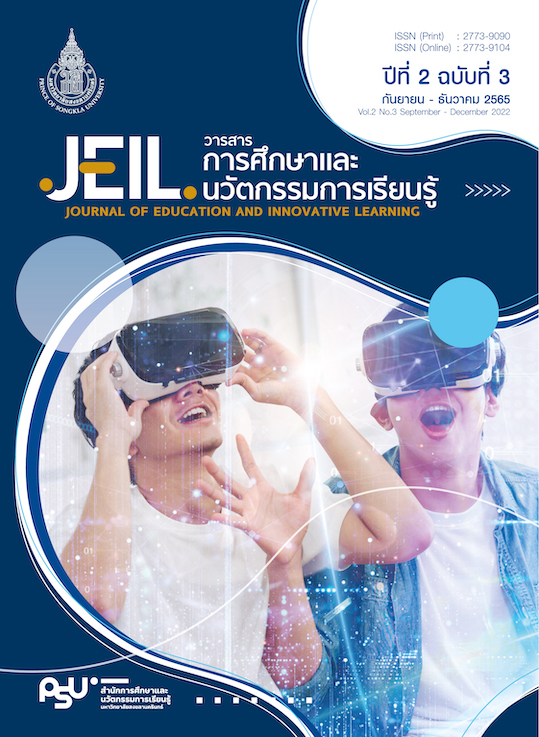การหาประสิทธิภาพคู่มือการประดิษฐ์จรวดขวดน้ำ ตามขั้นตอนโครงงานสะเต็มศึกษา สำหรับนักเรียนชั้นประถมศึกษาตอนปลาย
Main Article Content
บทคัดย่อ
จรวดขวดน้ำเพื่อการศึกษา เป็นกิจกรรมที่ทำให้เกิดการบูรณาการทักษะและความรู้ด้านวิทยาศาสตร์แก่เด็กและเยาวชน การวิจัยในครั้งนี้มีวัตถุประสงค์ 1) เพื่อสร้างและหาประสิทธิภาพคู่มือการประดิษฐ์จรวดขวดน้ำตามขั้นตอนโครงงานสะเต็มศึกษา 2) เพื่อเปรียบเทียบผลสัมฤทธิ์ทางการเรียนก่อนเรียนและหลังเรียน เมื่อใช้คู่มือการประดิษฐ์จรวดขวดน้ำ ตามขั้นตอนโครงงานสะเต็มศึกษา และ 3) เพื่อศึกษาความพึงพอใจของนักเรียนที่มีต่อคู่มือการประดิษฐ์จรวดขวดน้ำ ตามขั้นตอนโครงงานสะเต็มศึกษา สำหรับนักเรียนประถมศึกษาตอนปลาย กลุ่มเป้าหมายเป็นนักเรียนชั้นประถมศึกษาปีที่ 5 ปีการศึกษา 2565 โรงเรียนบ้านกุ่ม สำนักงานเขตพื้นที่การศึกษาประถมศึกษาอุบลราชธานี เขต 3 จำนวน 20 คน เครื่องมือที่ใช้ในการวิจัย ได้แก่ คู่มือการประดิษฐ์จรวดขวดน้ำ ตามขั้นตอนโครงงานสะเต็มศึกษา สำหรับนักเรียนประถมศึกษาตอนปลาย แบบทดสอบวัดผลสัมฤทธิ์ทางการเรียน และแบบสอบถามความพึงพอใจของนักเรียน สถิติที่ใช้ในการวิจัย ได้แก่ ค่าร้อยละ ค่าเฉลี่ย ส่วนเบี่ยงเบนมาตรฐาน การหาค่าประสิทธิภาพ (E1/E2) และ t-test ผลการวิจัย พบว่า 1) ประสิทธิภาพของคู่มือการประดิษฐ์จรวดขวดน้ำ ตามขั้นตอนโครงงานสะเต็มศึกษา สำหรับนักเรียนประถมศึกษาตอนปลาย มีค่าเท่ากับ 79.17/75.75 ซึ่งสูงกว่าเกณฑ์ที่กำหนดไว้ คือ 75/75 2) ผลสัมฤทธิ์ทางการเรียนหลังเรียนมีคะแนนสูงกว่าก่อนเรียนอย่างมีนัยสำคัญทางสถิติที่ระดับ .01 และ 3) นักเรียนมีความพึงพอใจในระดับมากที่สุด (mean=4.55, S.D.=0.52)
Article Details

อนุญาตภายใต้เงื่อนไข Creative Commons Attribution-NonCommercial-NoDerivatives 4.0 International License.
เนื้อหาและข้อมูลในบทความที่ตีพิมพ์ในวารสารการศึกษาและนวัตกรรมการเรียนรู้ ถือเป็นข้อคิดเห็นและความรับผิดชอบของผู้เขียน ซึ่งกองบรรณาธิการวารสาร ไม่จำเป็นต้องเห็นด้วยหรือร่วมรับผิดชอบใด ๆ และไม่สงวนสิทธิ์การคัดลอกบทความเพื่อใช้ประโยชน์ทางวิชาการ แต่ให้อ้างอิงข้อมูลแสดงที่มาของบทความทุกครั้งที่นำไปใช้ประโยชน์
เอกสารอ้างอิง
Hayeebaka, A., Jarong, I., & Dasaesamoh, A. (2014). Studies of projectile motion using digital video analysis: A case study of water rocket. Princess of Naradhiwas University Journal, 6(3), 83-91. [in Thai]
Kharoendee, K., Khamhaengpol, A., & Pansuppawat, A. (2022). Development of problem-solving abilities of prathomsuksa 5 students on the topic of change of substance by using STEM education. Journal of MCU Peace Studies, 10(1), 160-174. [in Thai]
Klomim, K. (2016). Learning management based on STEM education for student teachers. Journal of Education Naresuan University, 18(4), 334-348. [in Thai]
Ladachart, L., & Ladachart, L. (2022). STEM identity: Another factor that will promote achievement of STEM education in Thailand. Journal of Science and Science Education, 5(1), 148-157. [in Thai]
Maneekanta. P. (2021). Development of mathematical learning activities based on STEM education emphasizing analytical thinking on decimals and fractions for mathayomsuksa 1 (master’s thesis). Sakon Nakhon Rajabhat University, Sakon Nakhon, Thailand. [in Thai]
Ministry of Education. (2008). Basic Education Core Curriculum B.E. 2551 (A.D. 2008). Retrieved from http://academic.obec.go.th/images/document/1559878925_d_1.pdf [in Thai]
National Science Museum Thailand. (2022, January 19). Thailand Water Rocket Championship #21. Retrieved from https://www.nsm.or.th/nsm/th/node/8030 [in Thai]
National STEM Education Center. (2015). STEM Network Manual. Bangkok: The institute for the Promotion of Teaching Science and Technology. [in Thai]
Phonlek, S., Khamhaengpol, A., & Suwannatrai, K. (2021). Development of creative thinking of grade 10 students on the topic of organisms’basic chemistry by using STEM education with sufficiency economy philosophy. Journal of Rangsit University: Teaching & Learning, 15(1), 210-224. [in Thai]
Polyiem, T. (2018). STEM education: Introduction to integrated classroom. Journal of Faculty of Education Pibulsongkram Rajabhat University, 5(2), 122-135. [in Thai]
Ruengrung, S. (2022). The development of the scientific process skills using the manual of artifacts from local materials by STEM education approaches under the outbreak of the coronavirus 2019 (COVID-19). Journal of Science and Science Education, 5(1), 124-140. doi:10.14456/jsse.2022.11 [in Thai]
Ruengrung, S. (in press). The effect of utilizing STEM BCG as project-based learning in solving local problems on Grade-6 students to increase learning achievement and problem-solving abilityin science and technology. Journal of Science and Science Education, 6(1), 2023 (Online-first version). [in Thai]
Ruengrung, S., Sukmas, T., & Kaewtubtim, P. (2020). The development of practical manual for creating experimental package on applying law of conservation of energy in calculation on moment of inertial for students in mathayomsuksa 4, Demonstration School Prince of Songkla University. Proceeding of the 3rd Teacher Professional Innovation Network of Teacher Education Institutes in the Lower South, 545-562. Retrieved from http://www.edu.tsu.ac.th/official/site/microsite/ResearchSeminar2020/Proceeding63-24.03.63.pdf [in Thai]
Sangket, P. (2021). Learning Achievement Integrated Science Process Skills and Attitude towards Chemistry for Eleventh Grade Students using STEM Education Approach (Master’s thesis, Burapha University, Chonburi, Thailand). Retrieved from http://ir.buu.ac.th/dspace/bitstream/1513/222/1/61910085.pdf [in Thai]
Singsanae, P. (2006). PET bottle rocket fun. Retrieved from https://www2.mtec.or.th/th/e-magazine/admin/upload/226_71-78-edit.pdf
Srisa-Ard, B. (2013). Basic Research (9th ed.). Bangkok: Suweeriyasan. [in Thai]
Visetsuvarnabhumi, K. (2019). Satit PSU STEM innovation project-based learning [Handout]. Pattani, Thailand: Faculty of Education, Prince of Songkla University. [in Thai]


